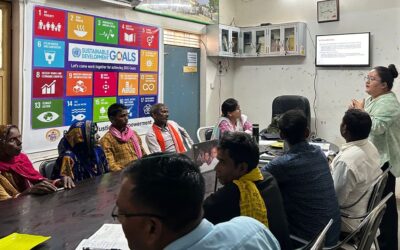The writing’s on the wall – literally. Free the Slaves partner MSEMVS has been painting messages in Indian communities to educate people about the risks of leaving home to find work.
Thousands of Indian laborers migrate each year to the Middle East. For many, it’s a journey into modern slavery.
Free the Slaves and Verité are working with Indian community groups to disseminate information about the warning signs of exploitative foreign work opportunities. One of the best ways to reach the public is to paint simple messages on village walls.
“Only one key to work successfully in a foreign country,” the graffiti says. “Get in touch with the P.O.E and collect information about the resources available.”
The P.O.E. is the Protector of Emigrants, a government office that helps laborers get proper passports, visas, and insurance – along with information about whether a recruiting agent is properly registered. The agency also provides information about resources available to migrant workers inside a host country, which can be very helpful in time of need.
Migration is a fundamental human right, but traffickers take advantage of migrants who don’t know the telltale signs of a scam. The writing on the wall will reach tens of thousands of Indians in 60 villages, giving migrants vital information to work safely overseas.
Learn more about our safe migration project in India here.
Tsering Diskit is the Asia Program Officer for Free the Slaves




